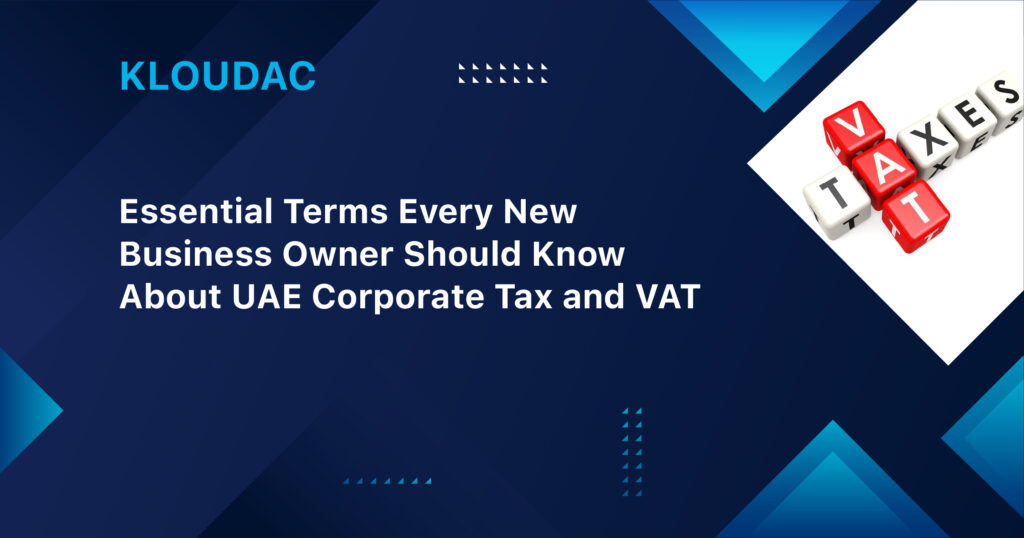Understanding the UAE tax system is no longer optional for business owners; it is now essential. Whether you’re launching a small startup or expanding your operations, terms like corporate tax, VAT, and taxable person will now shape how you operate. This glossary-style blog breaks down key tax concepts, enabling you to make informed decisions and stay compliant.
Corporate Tax in the UAE: What Every Business Owner Needs to Know
The UAE introduced federal corporate tax in 2023 to align with global standards. It applies to businesses across sectors, with a 0% rate for small profits and a 9% standard rate above the income threshold.
Corporate Tax Overview
- Standard Rate: 9% on taxable profits exceeding AED 375,000
- Exemption Threshold: 0% tax on profits up to AED 375,000
- Mandatory Registration: Every business, even if exempt, must register for corporate tax with the Federal Tax Authority (FTA)
Key Terms Explained
| Term | Definition |
| Corporate Tax (CT) | A direct tax on business profits enforced by the UAE government |
| Taxable Person | Any entity or individual required to register and pay CT |
| Small Business Relief | A tax relief scheme for businesses with revenues under AED 3 million (valid until 2026) |
| Qualifying Free Zone Person (QFZP) | A Free Zone entity that meets specific conditions to enjoy a 0% CT rate |
| Juridical Person | A company or other legal entity is considered separate from its owners |
| Natural Person | An individual conducting business, such as freelancers or sole proprietors |
| Taxable Income | Net income after allowable deductions and reliefs |
| Tax Period | Usually, the calendar year or the company’s financial year for CT filing |
| Tax Registration Number (TRN) | A unique number issued by the FTA for corporate tax and VAT purposes |
| Exempt Person | Government bodies, charities, public pension funds, and certain other entities not subject to CT |
| Loss Carry Forward | Businesses can carry forward tax losses to offset future profits, reducing CT liability |
VAT in the UAE: A Simple Glossary for Entrepreneurs
Value Added Tax (VAT) is a 5% consumption tax applied to most goods and services in the UAE. Introduced in 2018, VAT is collected at each stage of the supply chain and submitted to the FTA.
When VAT Applies
- Mandatory Registration: Annual taxable turnover exceeds AED 375,000
- Voluntary Registration: Turnover between AED 187,500 and AED 375,000
- Exemptions: Certain financial services, residential properties, and local passenger transport
Glossary of Common VAT Terms
| Term | Definition |
| Value Added Tax (VAT) | An indirect tax on the consumption of goods and services |
| Taxable Supplies | Goods/services subject to VAT (either 5% or 0%) |
| Exempt Supplies | Goods/services not subject to VAT and with no recovery of input VAT |
| Zero-Rated Supplies | Supplies taxed at 0%, allowing recovery of input VAT |
| Input Tax | The amount of VAT that a business pays on purchases or expenses, recoverable from the FTA |
| Output Tax | The amount of VAT that a business collects from customers on its sales |
| Tax Invoice | A document issued to show VAT charged, mandatory for recoverable claims |
| Reverse Charge Mechanism | When the buyer accounts for VAT instead of the foreign supplier |
| Tax Group | Two or more entities registered under a single VAT TRN to file consolidated returns |
| VAT Return | The official form submitted to the FTA, usually quarterly, to declare collected and paid VAT |
Common Misunderstandings to Avoid
- “We’re small, so we don’t need to register.”
Every business, even if under the threshold, must register for corporate tax. - “0% VAT means no registration.”
Zero-rated doesn’t mean exempt; you still must register and file returns if you cross the threshold. - “UAE Free Zones are always tax-free.”
Only Qualifying Free Zone Persons can enjoy 0% CT; its eligibility depends on strict conditions.
Why This Matters for New Business Owners
Getting comfortable with corporate tax and VAT terminology isn’t just for accountants. Knowing the difference between taxable supply and exempt supply, or between a natural person and a juridical person, helps you:
- Avoid penalties for non-compliance
- Structure your business for tax efficiency
- Claim reliefs or exemptions you’re entitled to
- Plan for cash flow around tax periods
- Build trust with investors, banks, and authorities
Stay Compliant, Stay Confident
Navigating UAE corporate tax and VAT regulations can feel overwhelming, especially if you’re just starting your business journey. But with the right knowledge and professional support, you can turn compliance into a strategic advantage.
Want expert help registering for corporate tax, managing VAT returns, or identifying relief opportunities?
KLOUDAC’s tax professionals are here to simplify the process for you.
📞: +971 50 43 53 515
Email: info@kloudac.com
